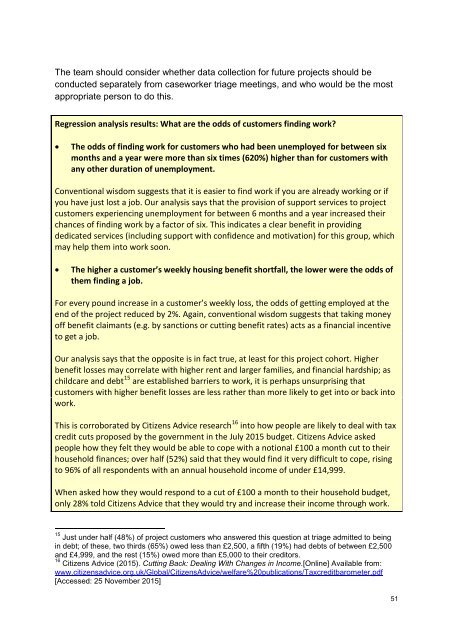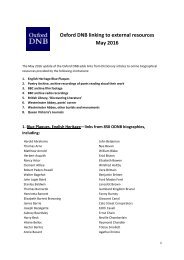Welfare Reform Team Evaluation of European Social Fund pilot project 2014-2015
welfare_reform_european_social_fund_project_evaluation_report
welfare_reform_european_social_fund_project_evaluation_report
You also want an ePaper? Increase the reach of your titles
YUMPU automatically turns print PDFs into web optimized ePapers that Google loves.
The team should consider whether data collection for future <strong>project</strong>s should be<br />
conducted separately from caseworker triage meetings, and who would be the most<br />
appropriate person to do this.<br />
Regression analysis results: What are the odds <strong>of</strong> customers finding work?<br />
• The odds <strong>of</strong> finding work for customers who had been unemployed for between six<br />
months and a year were more than six times (620%) higher than for customers with<br />
any other duration <strong>of</strong> unemployment.<br />
Conventional wisdom suggests that it is easier to find work if you are already working or if<br />
you have just lost a job. Our analysis says that the provision <strong>of</strong> support services to <strong>project</strong><br />
customers experiencing unemployment for between 6 months and a year increased their<br />
chances <strong>of</strong> finding work by a factor <strong>of</strong> six. This indicates a clear benefit in providing<br />
dedicated services (including support with confidence and motivation) for this group, which<br />
may help them into work soon.<br />
• The higher a customer’s weekly housing benefit shortfall, the lower were the odds <strong>of</strong><br />
them finding a job.<br />
For every pound increase in a customer’s weekly loss, the odds <strong>of</strong> getting employed at the<br />
end <strong>of</strong> the <strong>project</strong> reduced by 2%. Again, conventional wisdom suggests that taking money<br />
<strong>of</strong>f benefit claimants (e.g. by sanctions or cutting benefit rates) acts as a financial incentive<br />
to get a job.<br />
Our analysis says that the opposite is in fact true, at least for this <strong>project</strong> cohort. Higher<br />
benefit losses may correlate with higher rent and larger families, and financial hardship; as<br />
childcare and debt 15 are established barriers to work, it is perhaps unsurprising that<br />
customers with higher benefit losses are less rather than more likely to get into or back into<br />
work.<br />
This is corroborated by Citizens Advice research 16 into how people are likely to deal with tax<br />
credit cuts proposed by the government in the July <strong>2015</strong> budget. Citizens Advice asked<br />
people how they felt they would be able to cope with a notional £100 a month cut to their<br />
household finances; over half (52%) said that they would find it very difficult to cope, rising<br />
to 96% <strong>of</strong> all respondents with an annual household income <strong>of</strong> under £14,999.<br />
When asked how they would respond to a cut <strong>of</strong> £100 a month to their household budget,<br />
only 28% told Citizens Advice that they would try and increase their income through work.<br />
15 Just under half (48%) <strong>of</strong> <strong>project</strong> customers who answered this question at triage admitted to being<br />
in debt; <strong>of</strong> these, two thirds (65%) owed less than £2,500, a fifth (19%) had debts <strong>of</strong> between £2,500<br />
and £4,999, and the rest (15%) owed more than £5,000 to their creditors.<br />
16 Citizens Advice (<strong>2015</strong>). Cutting Back: Dealing With Changes in Income.[Online] Available from:<br />
www.citizensadvice.org.uk/Global/CitizensAdvice/welfare%20publications/Taxcreditbarometer.pdf<br />
[Accessed: 25 November <strong>2015</strong>]<br />
51




